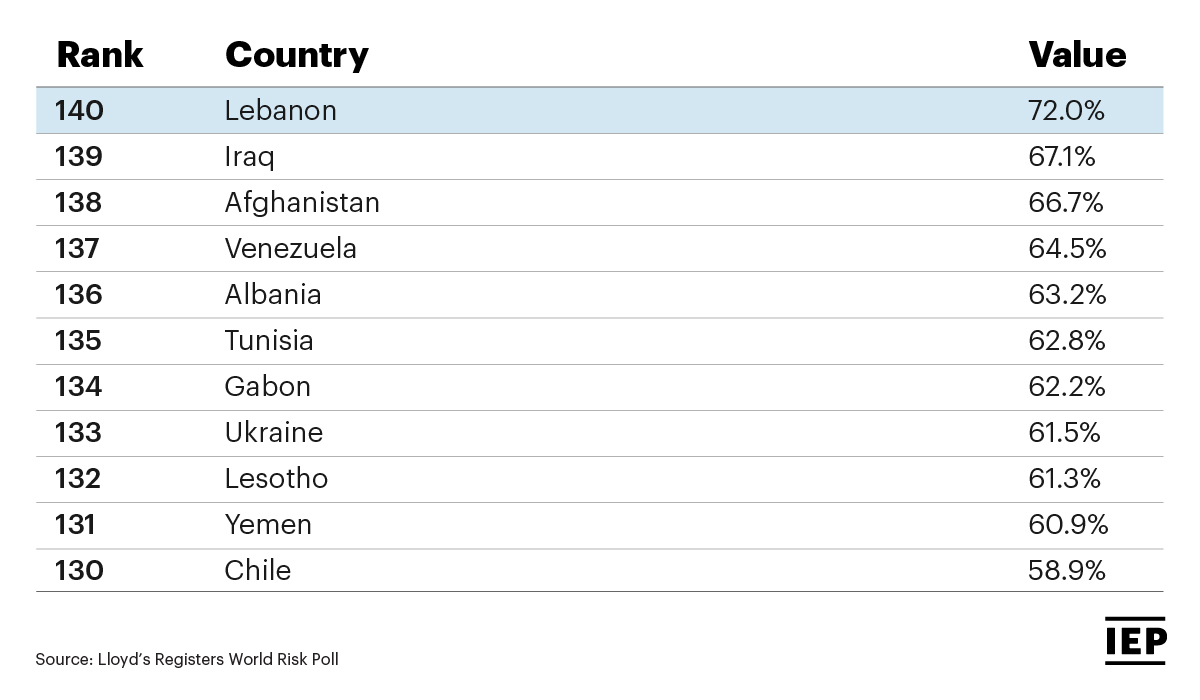Lloyd’s Register Foundation World Risk Poll Snapshot
The Lloyd’s Register Foundation World Risk Poll is an ongoing project in which 150,000 people in 142 counties are asked 75 questions relative to their experiences and perception of risk. The poll, first conducted in 2019, sets an important baseline from which changes of experiences and perception of risk in a post COVID world can be measured. Currently the Institute of Economics and Peace is analysing the first data set and each week we offer a snapshot of what we’ve learned so far.
Lebanon
For more than two years Lebanon has been in a economic crisis, which has been spiralling violently in the last few weeks, with fuel scares, power intermittent and the local currency becoming next to worthless.
A number of factors have contributed to this economic meltdown, including the war in Syria, a rise in the power of Shiite paramilitary group Hezbollah and the Beirut Port disaster of August 2020. Most speculators and informed locals say, however, these factors exacerbated a crisis that was created by the ineptitude of the Lebanese government and the Lebanese system of government, which is riddled with corruption and clientelism and has so far resisted reform and upheaval.
This view is reflected in the Lloyd’s Registers Foundation World Risk Poll data, indicating that Lebanese respondents were highly mistrusting of their government and are the global cohort least likely to trust their government with public utilities.
The Lloyd’s Registers Foundation World Risk Poll has three question about government trust and public utilities, asking: ‘Does the government do a good job ensuring that the following are safe or not?: ‘the food you buy’ ‘the water you drink’ and ‘the powerlines where you live.’
When asking about food, 70% or Lebanese respondents said they didn’t trust their government to ensure their food was safe. This made the country least trusting ahead of Iraq (66.5%), Romania (64.5%), Afghanistan (64%) and Croatia (63.5%).
When asking about water safety, 72% of Lebanese respondents say they didn’t trust their government to provide safe drinking water. This again put Lebanon atop the list of most distrusting populaces.
Lebanon was the third most distrusting nation when asked about powerline safety, with a 67.9% of Lebanese respondents saying they didn’t trust their government to provide safe powerlines where they lived. This put Lebanon behind Afghanistan at 73.8% and Venezuela at 69.2% and ahead of Iraq and Ethiopia.
These responses starkly highlighted how distrusting the Lebanese people are of their government when set against Lebanese responses to questions about their fear of consuming tainted food or water.
When asked about how likely they thought it was that the food they ate would cause them serious harm, 23.6% of Lebanese respondents said it was very likely. This meant there were 42 countries who were more concerned about the food they ate.
When asked about how likely they thought it was that the water they drank was a serious threat to their heath, 21.5% of Lebanese respondents said it was very likely. This meant there were 44 countries who were more concerned about the food they ate.
In another question of trust, respondents were asked how likely they thought it was that their neighbour would return a small bag of great financial value to them if lost and overwhelming Lebanese respondents said they thought their neighbour would return the item. Only 7% of Lebanese respondents said they thought it was likely the neighbour would keep the item.
This put Lebanon in the top twenty countries most trusting of their neighbours, most of which were advanced western democracies but also included Iran.
